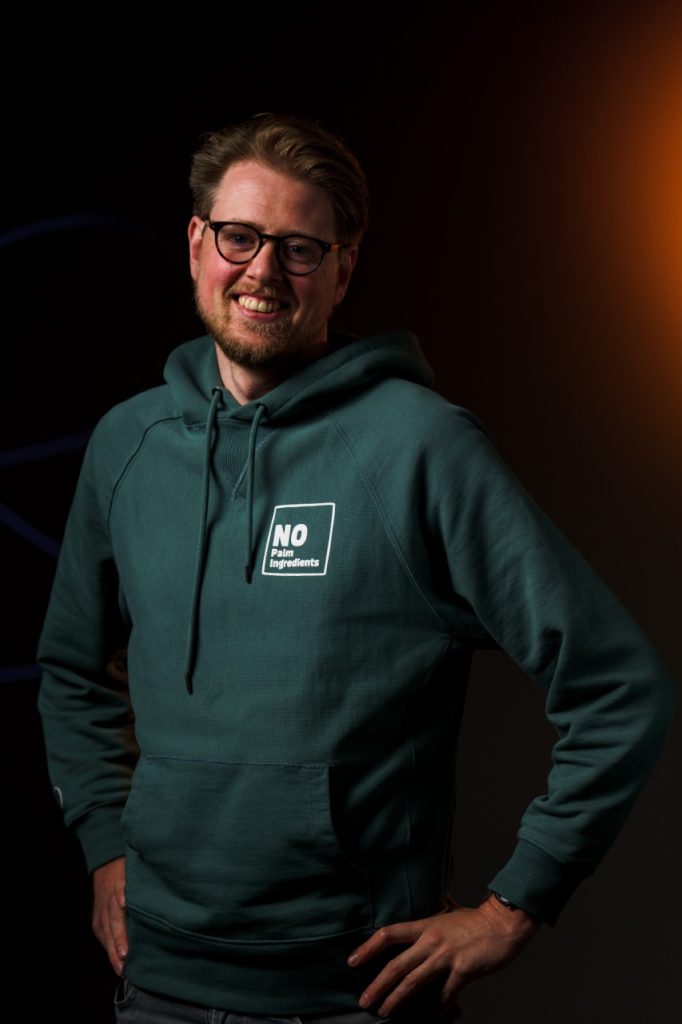A conversation with Lars Langhout, Founder and CEO at NoPalm Ingredients
Palm oil production is one of the biggest sustainability challenges we face today. Deforestation at catastrophic levels, water use, land use, species loss, biodiversity loss and top soil degradation are all common in the industry. But NoPalm Ingredients may just have the solution: a fermented microbial oil made from industrial side stream products that could replace Palm Oil globally. Here, we talk to Lars about the industry and the potential for NoPalm.

What is palm oil and why is it problematic?
Palm oil is known to be one of the most efficient crops that exist in the world today. It’s derived from the pulp and kernels of the palm oil tree and due to its efficiency has a huge global demand. In essence it is the most productive vegetable oil that exists, requiring little land and water for a high output. However, that’s not the case if we look at the true cost of palm oil.
Palm oil is the main contributor to deforestation in Indonesia and Malaysia and is also grown throughout Asia, South America and Africa. The cutting and burning of rainforest releases large amounts of CO2 in the atmosphere, as does soil tilling. We’re left with a monoculture crop that causes total biodiversity loss and damaged soil, further inhibiting the natural cycles carbon storage. Pesticides and fertilizers are also damaging, alongside the intense chemical processes to purify the palm oil to factories and consumers all over the world is another layer of unnecessary travel.
Aside from the environmental impact, there is also a health impact. Palm oil is high in polyunsaturated fatty acids, which many studies suggest are linked cardiovascular disease and other health conditions.
Palm oil alternatives such as coconut, sunflower and soy oils share similar challenges however often use more land, more water and hold similar associated health risks. Supply chain transparency in all of these products isn’t good and from a social perspective, little is known.
What is NoPalm and how can it change the palm oil industry?
NoPalm produces a sustainable microbial oil to replace palm oil in food and cosmetics. It’s made from side streams such as carrot peels and beetroot tops and uses fermentation to produce a product with a similar structure palm oil. It’s made locally from side streams all over the world.
Here, we have a product that causes 0 deforestation, considerably lower emissions and less water, while protecting biodiversity, engaging local labor and improving the health profile of the oil.
What are the biggest challenges now and in the future for NoPalm?
One of our biggest challenges at the moment is scaling. The faster we can grow and prove our value globally, the sooner we can get palm oil off the table. We hope our product can come to market as soon as possible, which may take a little longer in the food industry compared to cosmetics due to regulatory processes.
In the future, we can predict some push back from the palm oil industry. If we look at other sustainable alternatives, largely funded lobby groups have the potential to cast doubt into consumers about the health benefits of alternatives. But consumers need to learn that microbial oil is safe and we consider it part of our role to educate them too. Our process is more similar to fermenting beer than it is to the chemical process of palm oil extraction and that gives us confidence that consumers will see it as a safe and sustainable alternative.
Why did you agree to partner with Icos?
We initially agreed that the team had the right experience and skillset to help at this stage of growth. They had an impressive network to our growth trajectory and we believed their strategic investment could help us expand internationally. More importantly though, we saw their passion for sustainability and commitment to help us rid the world of traditional palm oil.
To find out more about NoPalm, head to nopalm-ingredients.com
